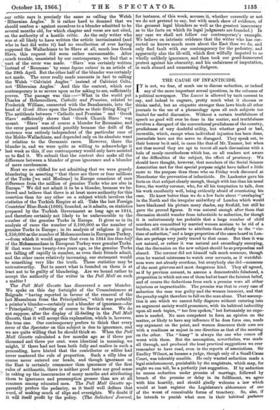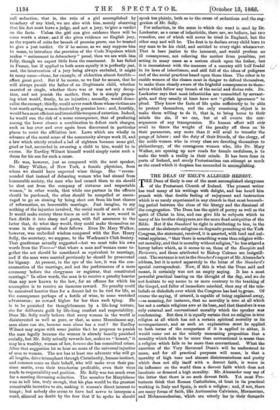THE CAUSE OF INFANTICIDE.
Iis not, we fear, of much use to discuss seduction, or indeed 1 any of the more important sexual questions, in the columns of a political newspaper. The Lancet is allowed by tacit consent to say, and indeed to engrave, pretty much what it chooses or thinks useful, but an etiquette stronger than laws binds all other journals to the use of a phraseology upon all such subjects too limited for useful discussion. Without a certain truthfulness of speech no good will ever be done in the matter, and truthfulness involves a disregard of the conventional prudishness of the country, prudishness of very doubtful utility, but whether good or bad, incurable, which, except when individual injustice has been done, journalists have not the nerve to disregard. They speak out, to their honour be it said, in cases like that of Mr. Toomer, but when not thus moved they are apt to invest all such discussions with a halo of mealy-mouthedness which has, on all readers not aware of the difficulties of the subject, the effect of pruriency. We. should have thought, however, that members of the Social Science Association met for that special purpose might have talked a little more to the purpose than those who on Friday week discussed at Manchester the prevention of infanticide. Dr. Lankester gave his facts on that subject clearly enough, though with less than his usual force, the worthy coroner, who, for all his temptation to talk, does his work excellently well, being evidently afraid of overstating his case. He knew better than we do a few facts about " overlaying" in the North and the irregular midwifery of London which would have blackened his picture many shades, say fivefold, but still he- gave the proved figures. It was natural enough after them that- discussion should wander from infanticide to seduction, for though it is unfortunately too probable that a large number of child murders are committed by married women anxious to be rid of a burden, still it is etiquette to attribute them chiefly to the "vic- tims of seduction," and a large proportion of the cases heard in Lon- don are perhaps very justly traced to that cause. But then it was not natural, or rather it was natural and exceedingly annoying, that the discussion on the new subject should be so purposeless and absurd. The coroner did not himself talk much nonsense, though even he wanted mistresses to watch over servants, as if watchful- ness were not already overdone, but everybody else did—nonsense of the most grievous and most dangerous kind. They all agreed, as if by previous consent, to assume a demonstrable falsehood, a proposition in which not one of them had at heart the faintest belief, and of course the deductions from such a premiss were all either injurious or impracticable. The premiss was that in every case of seduction the man was guilty and the woman innocent, and that the penalty ought therefore to fall on the man alone. That assump- tion is one which we cannot fully disprove without entering into an argument society would pronounce, with its habitual imbecility upon all such topics, " too free spoken," but fortunately no expo- sure is needed. No man competent to form an opinion on the matter, or likely to have any influence if he does form one, needs any argument on the point, and women denounce their own sex with a readiness as unjust in one direction as that of the meeting on the other. The " hussy " is always the one who comes off worst with them. But the assumption, nevertheless, was made all through, and produced the least practical suggestions we ever remember to have read, even in the reports of associations. Sir Eardley Wilmot, as became a judge, though only of a Small Cause Court, was tolerably sensible. He only wanted seduction made a legal misdemeanour, punishable by the magistrate, which may, for aught we can tell, 'be a perfectly just suggestion. If by seduction he means seduction under promise of marriage, followed by breach of the promise or delay in its fulfilment, we agree with him heartily, and should gladly welcome a law which would at least register the Legislature's abhorrence of one of the worst of conceivable forms of treachery. So, also, if he intends to punish what men in their habitual parlance call seduction, that is, the ruin of a girl acceraplished by treachery of any kind, we are also with him, merely observing that his Act must leave a judge, and not a jury, to givea verdict on the facts. Unless the . girl can give evidence there will be none worth .a straw, and if she gives evidence no English jury, as the reports of suits for breach of promise prove, can be trusted to give a just verdict. Or if he means, as we may suppose him to mean, to introduce the provision of the •Code Napoleon which makes " enticement to debauchery" penal, then we are with him fully, though we expect little from the enactment. It has failed in France, but if applied to both sexes equally it is perfectly just, and, the intervention of a jury being always excluded, it might in many cases—those, for example, of abduction almost forcible— effect great good. But if he means, as we fear he means, that he will always punish the father of an illegitimate child, whether married or single, whether there was or was not any decep- tion, and not punish the mother, then he is simply propos- ing what would, firstly, be an injustice ; secondly, would demo- ralize the exempt; thirdly, would never reach those whose victims are best worth saving, women deceived by genuine love ; and, fourthly, -would be a most efficient and irresistibleweapon of extortion. Indeed, he would run the risk of a worse consequence, that of producing among the lower classes a combination to defeat such charges, such as has over and over again been discovered in particular places to resist the affiliation law. Laws which are wholly in advance of the moral sense of the community always work ill, and a la'w which utterly crushed a lad of eighteen because some girl, good or bad, succeeded in swearing a child to him, would be in excess. Sir Eardley, Wilmot himself would simply resist such a doom for his son for such a cause.
He was, however, just as compared with the next speaker, Dr. Mary Walker, of New York, a female physician, from whom we should have expected wiser things. She " recom- mended that instead of debarring women who had sinned from honourable society, the men who had caused them to sin should be shut out from the company of virtuous and respectable women," in other words, that while one partner in the offence should be pardoned, the other should be compelled or encou- raged to go on sinning by being shut out from his best chance of reformation, an honourable marriage. Just imagine, to say nothing of the injustice involved, the social result of such a rule! It would make society three times as evil as it is now, would in fact divide it into sheep and goats, with full assurance to the latter that, do what they would, they could make themselves no worse in the opinion of their fellows. Even Dr. Mary Walker, however, was embodied wisdom compared with the Rev. Henry Solly, the secretary, we suppose, to the Workman's Club Society. That gentleman actually suggested—but we must take his own words from the Times--" that where a man and-woman came to- gether the act should be considered as equivalent to marriage, and if the man were married previously he should be prosecuted for bigamy. At present, in the eye of the law, it was the con- summation of the marriage, and not the performance of a mere ceremony before the clergyman or registrar, that constituted marriage." In other words, the man is to receive a penalty heavier than any now known to the law, for an offence for which his accomplice is to receive an immense reward. No penalty could be conceived heavier than for a decent lad to be tied for life, as the consequence perhaps of a bottle of wine, to some wretched adventuress ; no reward higher for her than such tying. /le is to be punished for thoughtlessness by a life-long torture, she for deliberate guilt by life-long comfort and respectability. Does Mr. Solly really believe that every woman in the world is disinterested as well as pure, or that, as some Mussulmans say, man alone can sin, because man alone has a soul ? Sir Eardley Wilmot may argue with some justice thst he proposes to punish the man legally because the woman is already heavily punished socially, but Mr. Solly actually rewards her, makes an " honest," it may be a wealthy, woman of her, because she has committed crime. After that suggestion let us hear no more of the universal injustice of man to woman. The sex has at least one advocate who will go all lengths, drive triumphant through Christianity, human instinct, and common sense on their behalf, who will make even their pas- sions merits, even their treacheries profitable, even their vices roads to respectability and position. Mr. Solly was too much even for a meeting discussing seduction. The member for Marylebone rose to tell him, truly enough, that his plan would be the greatest conceivable incentive to sin, making it women's direct interest to tempt; but nobody else seems to have had nerve to interpose a word, silenced no doubt by the fear that if he spoke he should
speak too plainly, both as to the cause of seductions and the sug- gestion of Mr. Solly.
For seduction, in the sense in which the word is used by Lankester, as a cause of infanticide, there are, we believe, but two remedies, one of which will never be tried An England, bat the other may and will be. The first is to declare every child born to any man to be his child, and entitled to every right whatsoever. That is bare justice to the innocent, and would produce no ill consequence, not relieving the mother from penalties, yet acting in many cases as a serious check upon the father, but it is inconsistent with the manners of a country still half feudal in its laws of inheritance, and still full of the ideas of pedigrees and of the social practices based upon those ideas. The other is to enable women of the classes moat in danger to defend themselves, to make them clearly aware of the frightful consequences to them- selves which follow any breach of the social and divine rule. Dr. Lankester says that most infanticides are committed by servant- girls, and they usually at least have not "girlish ignorance" to plead. They know the facts of life quite sufficiently to be able to protect themselves, and the only remaining object is to make them willing to do it, that is, to bring home to their minds the sin, if we can, but at all events the gen= sequences of any transgression. No human effort will This avail to throw the weight of the penalty off them on' to their paramours, any more than it will avail to transfer the pangs of labour ; and the duty of their friends, qf the. clergy, of the noble women who in every class are devoting themselves to philanthropy, of the courageous women who, like Dr. Mary Walker, are opening up new roads for female usefulness, is to make the truth a reality in their minds. It has been dope in parts of Ireland, and surely Protestantism can attempt as much as the creed which it despises has succeeded in accrimplishing.































 Previous page
Previous page